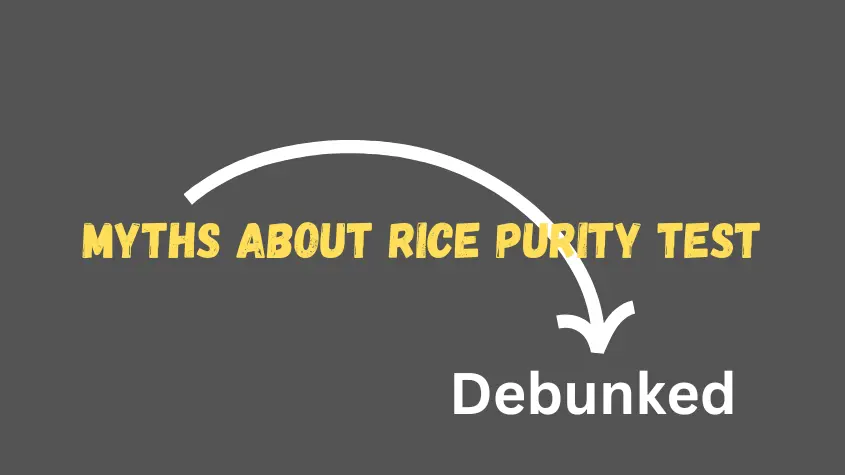Debunking 10 Myths About Rice Purity Test
The Rice Purity Test has become a ubiquitous presence on college campuses and across social media platforms. Originating from Rice University, this test claims to measure one’s innocence or experience based on a series of questions about various activities. However, like many online phenomena, the Test is not immune to misconceptions and myths. In this article, we will debunk 10 common myths about Rice Purity Test to shed light on its true nature.
10 Myths About Rice Purity Test

Myth 1: The Rice Purity Test is an Official Assessment
Contrary to popular belief, the truth is that the Rice Purity Test is not an official assessment or measure of one’s character. Despite the myths about Rice Purity Test circulating, it’s essential to understand that it’s a fun and informal quiz created by students at Rice University for entertainment purposes. It doesn’t hold any scientific validity or accreditation.
It is always interesting to read about the Rice purity Test QUestions.
Myth 2: A Low Score Indicates Immorality
This myth has also been debunked. Scoring low on the Rice Purity Test doesn’t necessarily imply immorality or questionable behavior. The test merely reflects the diversity of experiences individuals have had, ranging from the mundane to the extraordinary. It’s not a judgment of character but rather a reflection of personal experiences and dispelling the myths about the tests.
Myth 3: The Rice Purity Test is Accurate
While the Rice Purity Test can provide insights into one’s experiences, it’s far from accurate or comprehensive. the truth is that the questions are subjective, and individuals may interpret them differently based on their values and perspectives. Therefore, the test results should be taken with a grain of salt.
Myth 4: Taking the Test Is Mandatory
Participating in the Rice Purity Test is entirely voluntary. It’s not a requirement for admission to any institution or organization. People take the test out of curiosity or as a social activity, but there are no obligations attached to it.
Myth 5: Higher Scores Are Better
One of the common Myths About Rice Purity Test has also been debunked. There’s no inherent virtue in scoring high on the Rice Purity Test. Each person’s score reflects their unique experiences and choices, which may vary widely. Whether one scores high or low doesn’t determine their worth as an individual.
Myth 6: The Test Is Gender-Biased
The Rice Purity Test doesn’t discriminate based on gender. The questions are designed to cover a broad range of experiences that people of all genders may encounter. It aims to capture the diversity of human experiences rather than perpetuate gender stereotypes.
Myth 7: It’s Only for College Students
While the Rice Purity Test is popular among college students, it’s not exclusive to them. People from various age groups and backgrounds take the test out of curiosity or as a nostalgic throwback to their college days. It’s a cultural phenomenon that transcends college campuses.
Myth 8: The Test Is Static
The Rice Purity Test isn’t set in stone. Individuals may retake the test multiple times, and their scores may vary based on their experiences and perspectives. It’s a dynamic reflection of one’s journey rather than a fixed assessment.
Myth 9: It Reflects Social Status
Participating in the Rice Purity Test doesn’t indicate one’s social status or popularity. It’s a lighthearted activity enjoyed by people from all walks of life. The test transcends social boundaries and fosters a sense of camaraderie through shared experiences.
Myth 10: The Test Is Judgmental
Despite its name, the Rice Purity Test isn’t intended to judge or shame individuals for their choices. It’s a form of self-reflection and amusement that allows people to reminisce about their past experiences. The focus is on personal exploration rather than moral policing.
Read an insightful article on History of Rice Purity Test.
Conclusion
In conclusion, the Rice Purity Test is a fun and informal quiz that has garnered widespread popularity across various demographics. While it may reveal interesting insights into one’s experiences, it’s essential to debunk the Myths About Rice Purity Test recognize it for what it truly is—an entertaining diversion rather than a definitive assessment of character. So, the next time you encounter the Rice Purity Test, approach it with a sense of curiosity and amusement, knowing that it’s all in good fun.
Take another interesting quiz to know more about yourself, Innocence test.







